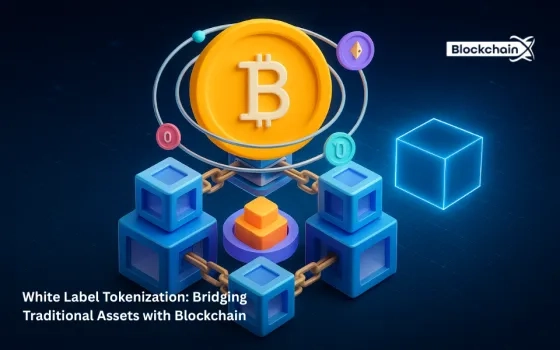
Blockchain technology is the greatest disruption that took the internet by storm when Bitcoin was launched in 2009. Since then, it has evoked interest and earned the trust of millions. Formally defined, Bitcoin is ‘an electronic payment system based on cryptographic proof instead of trust, allowing any two willing parties to transact directly without the need for a trusted third party.’
Blockchain, as a reformative technology, has reshaped businesses across the globe. The blockchain community in India might be well aware of the ins and outs of blockchain, Bitcoin, and other cryptocurrencies, but the majority of the people still fear and feel mystified due to the half or little knowledge they possess about blockchain. Let’s debunk a few myths that repel many from using it or believing in it:
#1 Cryptocurrencies were banned in India
This is the greatest misconception held by people. Bitcoin and other cryptocurrencies were never banned in India. RBI had put a ‘banking’ ban – which meant banks couldn’t support institutions engaged in crypto activities. Individuals were free to engage in crypto trade. And that is what they did with the WazirX P2P exchange, which also boasted the world’s first auto-matching engine and continues to see huge success today.
On March 5 2020, IAMAI (The Internet & Mobile Association of India) won the legal battle against RBI’s blanket banking ban considered unconstitutional by the Supreme Court of India. Post the ban, the blockchain and cryptos moved out of India to market like the USA and Singapore. Globally, ICOs and VC investments were able to raise billions of dollars.
This victory can prove a landmark move to speed up the adoption of digital currency as a mode of payment and transfer, and also provide an alternate route for startups to crowdsource funds. Besides, startups can use blockchain to innovate new technology and payment systems like wallets.
#2 Bitcoin cannot be used as a mode of payment in India
Although Bitcoin can never be a legal tender in India, it is nevertheless a decentralized digital asset for the simple reason that the central bank doesn’t issue it. Following the lifting of the ban, payments can be received and made in Bitcoin, provided a declaration about the date and time of receipt, and the rate of conversion from Bitcoin to fiat is well recorded. The same should be declared while calculating tax as well. Banking facilities will soon be restored once the regulations from various government agencies are cleared.
Every myth rests on a certain kind of truth. Bitcoin is becoming popular, and its markets are expanding, but Bitcoin cannot be considered as a regulated currency in India.
#3 Bitcoin cannot be used as a safe mode of investment
Banks and other financial institutions have either initiated or will initiate their operations with crypto exchanges and companies. Earlier, companies were shying away from investing in digital currency due to the RBI ban. Bitcoin now falls under the ambit of a payment medium and a trading commodity. The investment sector is witnessing a significant jump in venture capital investments. Investors are free to trade through crypto exchanges while making deposits through banks.
#4 Bitcoin is only used as a mode of payment in the dark web and other illegal trade
Bitcoin and blockchain tech are neutral scientific inventions whose use, disuse, and misuse would depend on the party concerned. Though it has earned some notoriety on the part of the drug peddling through the silk route marketplace or dark web, Bitcoin and other cryptocurrencies are used for ample positive purposes. We can connect the existence of this myth to the overhyped media frenzy of some exceptional cases. Bitcoin is a mode of exchange of value and has all its transactions hashed on the public blockchain. As such, digital currencies built over blockchain do not serve the criminal purpose well.
#5 Bitcoin = Blockchain
Most people consume these two terms as synonymous, hardly realizing the difference between the two. Blockchain is the digital ledger technology that records P2P transactions on a trustless network. Bitcoin is a cryptocurrency (the first one, to be precise) whose transactions are recorded over a blockchain by miners. Miners are people providing the required specialized computing power for solving complex mathematical problems that serve as the blocks containing verified transactions.
In other words – while Bitcoin relies on the blockchain, blockchains don’t need to be associated with Bitcoin necessarily.
#6 Bitcoin is a centrally controlled organization
Most people stick to the traditional concept of a central authority and define Bitcoin in the same terms. Decentralization is an inherent feature of the blockchain. There is no third party or a central agency involved. So Bitcoin is not an investment firm or payment portal like Paypal. It survives on independent miners who run nodes – keeping a record of the entire blockchain. The open-source code is available for audit to everyone. No third party can alter the contents of a blockchain centrally.
#7 Cryptocurrency doesn’t have any inherent value
People find it hard to believe in its credibility as a currency on the notion that it is based on ‘thin air.’ That means there is nothing that backs cryptos and bitcoins. This myth is somewhat understandable. After all, we’ve all been conditioned all our lives to associate value with some tangibility. Gold, materialistic items, these are all things we can touch and feel. Even software represents significant amounts of human work to achieve some goal.
But this isn’t true.
An important economic reality is that value is subjective in nature. Older times had gold and silver coins, and the trends have now shifted to nickel coins and paper currency having negligible or no value of their own. Think about it – we assign value to pieces of paper, for our convenience.
A currency, for instance, the US dollar, is in high demand in the exchange market and hence has a high value. The same goes for Bitcoin. Given its low fees, fast speed, and lack of centralization, it wins over many prevalent currencies. It’s society, and scarcity, that create value. The supply of bitcoins is limited to 21 million. This makes it even more valuable, assuming all other factors remain the same.
#8 Blockchain is always public
The first myth that people hold about blockchain is that it is a singular entity. The real case is radically different, with multiple blockchain types existing due to the forks witnessed in blockchain history. Besides, the more popular blockchain is public, which lends people the assumption that all blockchains are public. There are ways to keep your Bitcoin transactions private.
But blockchains can be public, private, or hybrid. Anyone can access a public blockchain like Bitcoin while all cannot access a private blockchain like Corda.
#9 Bitcoin is a pyramid scheme
Bitcoin is not any Ponzi scheme based on some pyramid structure where one investor sells to three, and those sell to another set of investors, thus creating a pyramid-like structure. As a matter of fact, Bitcoin is based on one of the most sophisticated technologies that the world has seen. The immutable and trustless nature of the ‘chain of blocks’ is unlike any pyramid set up to scam or dupe. Blockchain finds multiple uses beyond cryptocurrencies, such as supply chain management and diamond mining.
“There is fringe experimentation going on, but people are on a journey. They will move from fear to understanding and a respect for its potential, and they are in the latter phase of that journey.” – Seamus Cushley, PriceWaterHouseCoopers expert.
With the growing crypto trading markets and blockchain tech, a gradual shift is being witnessed from hostility towards acceptance. Many other myths surrounding blockchain are becoming redundant. Times are favorable for the digital currency revolution to take place in India, provided we keep ourselves informed more and more with changing times.
This blog was originally published here Subscribe here to get your weekly crypto updates 















